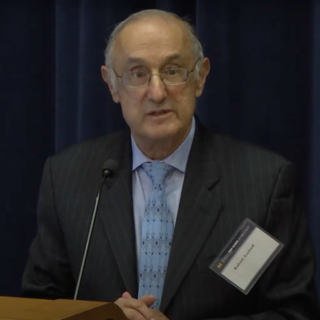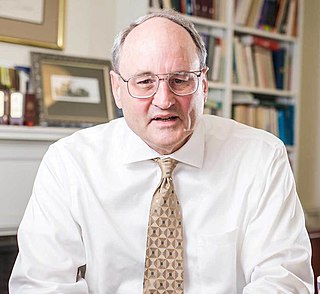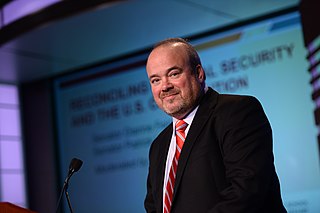Related Research Articles
William Harrison Riker was an American political scientist who is prominent for applying game theory and mathematics to political science. He helped to establish University of Rochester as a center of behavioral revolution in political science.

Robert Marshall Axelrod is an American political scientist. He is Professor of Political Science and Public Policy at the University of Michigan where he has been since 1974. He is best known for his interdisciplinary work on the evolution of cooperation. His current research interests include complexity theory, international security, and cyber security. His research includes innovative approaches to explaining conflict of interest, the emergence of norms, how game theory is used to study cooperation, and cross-disciplinary studies on evolutionary processes.
Philip Ernest Converse was an American political scientist. He was a professor in political science and sociology at the University of Michigan who conducted research on public opinion, survey research, and quantitative social science.

A political campaign is an organized effort which seeks to influence the decision making progress within a specific group. In democracies, political campaigns often refer to electoral campaigns, by which representatives are chosen or referendums are decided. In modern politics, the most high-profile political campaigns are focused on general elections and candidates for head of state or head of government, often a president or prime minister.

Theda Skocpol is an American sociologist and political scientist, who is currently the Victor S. Thomas Professor of Government and Sociology at Harvard University. She is best known as an advocate of the historical-institutional and comparative approaches, as well as her "state autonomy theory". She has written widely for both popular and academic audiences. She has been President of the American Political Science Association and the Social Science History Association.

Martin Emil Marty is an American Lutheran religious scholar who has written extensively on religion in the United States.

Kathleen Hall Jamieson is an American professor of communication and the director of the Annenberg Public Policy Center at the University of Pennsylvania. She co-founded FactCheck.org, and she is an author, most recently of Cyberwar, in which she argues that Russia very likely helped Donald J. Trump become the U.S. President in 2016.
An independent voter, often also called an unaffiliated voter or non-affiliated voter in the United States, is a voter who does not align themselves with a political party. An independent is variously defined as a voter who votes for candidates on issues rather than on the basis of a political ideology or partisanship; a voter who does not have long-standing loyalty to, or identification with, a political party; a voter who does not usually vote for the same political party from election to election; or a voter who self-describes as an independent.
Donald Sewell Lopez Jr. is the Arthur E. Link Distinguished university professor of Buddhist and Tibetan Studies at the University of Michigan, in the Department of Asian Languages and Cultures.

Susan Stewart is an American poet and literary critic. She is the Avalon Foundation University Professor in the Humanities and Professor of English, emerita, at Princeton University. In 2023, she was elected to the American Philosophical Society.
Thomas Cleveland Holt is an American historian, who is the James Westfall Thompson Professor of American and African American History at the University of Chicago. He has produced a number of works on the people and descendants of the African Diaspora. He served as president of the American Historical Association in 1994.

Larry Martin Bartels is an American political scientist and the Co-Director of the Center for the Study of Democratic Institutions and Shayne Chair in Public Policy and Social Science at Vanderbilt University. Prior to his appointment at Vanderbilt, Bartels served as the Donald E. Stokes Professor of Public Policy and International Relations and founding director of the Center for the Study of Democratic Politics at the Woodrow Wilson School of Public and International Affairs at Princeton University. He was elected a Member of the American Philosophical Society in 2019.
Alan Ira Abramowitz is an American political scientist and author, known for his research and writings on American politics, elections in the United States, and political parties in the United States.

Jane Jebb Mansbridge is an American political scientist. She is the Charles F. Adams Professor of Political Leadership and Democratic Values in the Kennedy School of Government at Harvard University.
Susanne Hoeber Rudolph was an American author, political thinker and educationist. She was a William Benton Distinguished Service Professor Emerita at the University of Chicago and was actively interested in Politics, Political Economy and Political Sociology of South Asia, State Formation, Max Weber and the Politics of Category and Culture. The Government of India, in 2014, honored her, along with her husband, Lloyd I. Rudolph, for their services to literature and education, by bestowing on them the third highest civilian award, the Padma Bhushan.
Benjamin Ingrim Page is the Gordon S. Fulcher professor of decision making at Northwestern University. His interests include American politics and U.S. foreign policy, with particular interests in public opinion and policy making, the mass media, empirical democratic theory, and political economy. In 2014, Page, alongside co-author Martin Gilens, appeared on The Daily Show to discuss their study that found the policy-making process of American politics is dominated by economic elites.
Paul Robert Abramson was an American political scientist known for his research and writing on American, European, and Israeli elections. He was a professor of political science at Michigan State University.

Henry E. Brady is an American political scientist specializing in methodology and its application in a diverse array of political fields. He was Dean of the Goldman School of Public Policy at University of California, Berkeley from 2009–2021 and holds the Class of 1941 Monroe Deutsch Professor of Political Science and Public Policy. He was elected President of the American Political Science Association, 2009–2010, giving a presidential address entitled "The Art of Political Science: Spatial Diagrams as Iconic and Revelatory." He has published academic works on diverse topics, co-authoring with colleagues at a variety of institutions and ranks, as well as many solo authored works. His principal areas of research are on political behavior in the United States, Canada, and the former Soviet Union, public policy and methodological work on scaling and dimensional analysis. When he became President of the American Political Science Association, a number of his colleagues and co-authors contributed to his presidential biography entitled "Henry Brady, Big Scientist," discussing his work and the fields to which he has contributed and has also shaped.
David William Rohde is an American political scientist and the Ernestine Friedl Professor of Political Science in the Trinity College of Arts and Sciences at Duke University. He has researched various aspects of American politics, including the Supreme Court and Congress. Before joining the faculty at Duke, he taught at Michigan State University (MSU) from 1970 to 2005. At MSU, he started the program "Political Institutions and Public Choice", which focused on encouraging collaborative research between faculty members and students. He started the same program at Duke when he joined their faculty in July 2005. He was the editor-in-chief of the American Journal of Political Science from 1988 to 1990.

Lawrence R. Jacobs is an American political scientist and founder and director of the Center for the Study of Politics and Governance (CSPG) at the University of Minnesota. He was appointed the Walter F. and Joan Mondale Chair for Political Studies at the University of Minnesota's Humphrey School of Public Affairs in 2005 and holds the McKnight Presidential Chair. Jacobs has written or edited, alone or collaboratively, 17 books and over 100 scholarly articles in addition to numerous reports and media essays on American democracy, national and Minnesota elections, political communications, health care reform, and economic inequality. His latest book is Democracy Under Fire: Donald Trump and the Breaking of American History. In 2020, he was elected a Fellow of the American Academy of Arts and Sciences.
References
- ↑ "Book of Members, 1780–2010: Chapter A" (PDF). American Academy of Arts and Sciences. Retrieved April 14, 2011.
- ↑ https://www.nasonline.org/news-and-multimedia/news/2024-nas-election.html
- Breznick, Alan. 2004. "John Aldrich." Dialogue (Duke University), 30 April.